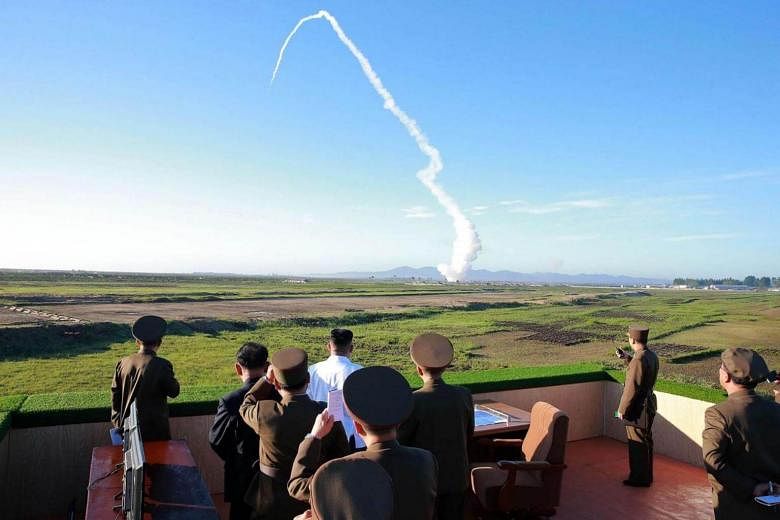SEOUL (REUTERS, BLOOMBERG, AFP) - North Korea test-fired what appeared to be a short-range ballistic missile on Monday (May 29) that landed in the sea off its east coast, the latest in a series of missile tests defying world pressure and threats of more sanctions.
The launch comes in fresh defiance of tough talk from United States President Donald Trump, who promised on Friday that the "big problem" of North Korea "will be solved". Trump's comments came at the G-7 summit in a meeting with Prime Minister Shinzo Abe of Japan, which along with South Korea is most immediately threatened by North Korean belligerence.
Abe swiftly condemned Monday's launch and vowed "concrete action" with the US. "We will never tolerate North Korea's continued provocations that ignore repeated warnings by the international community," Abe told reporters.
"As agreed during the G-7 summit, the North Korean problem is the international community's top priority. In order to deter North Korea, we will take concrete action with the United States," he said.
In Washington, a National Security Council spokesman said Trump had been briefed on the launch.
South Korea's new president, Moon Jae In, ordered a meeting of the national security council to assess the launch.
China urged North Korea to create the conditions for a return to talks after the launch.
"At present the situation on the Korean peninsula is complex and sensitive, and we hope all relevant sides maintain calm and exercise restraint," China's foreign ministry said in an e-mailed statement.
The missile was believed to be a Scud-class ballistic missile and flew about 450km, South Korea's Joint Chiefs of Staff said in a statement.
A South Korea military spokesman said on Monday the North's recent string of missile launches is seen as an attempt to apply pressure on South Korea to change policy. The Scud-class missile fired reached an altitude of 120km, the military spokesman told a briefing. He said South Korea's military was analysing how many missiles were fired, indicating that more than one may have been launched.
North Korea last test-fired a ballistic missile on May 21 off its east coast and on Sunday said it had tested a new anti-aircraft weapon supervised by leader Kim Jong Un.
If confirmed to be a ballistic missile, Monday's launch would be the North's ninth this year as Kim accelerates his nuclear weapons program.
North Korea has a large stockpile of Scud missiles, originally developed by the Soviet Union. Modified versions have a range of up to 1,000 km.
Pyongyang has conducted dozens of missile tests and tested two nuclear bombs since the start of 2016, in defiance of UN Security Council resolutions. It says the programme is necessary to counter US aggression.
The United States has said it was looking at discussing with China a new UN Security Council resolution and that Beijing, the main diplomatic ally of Pyongyang, realises time was limited to rein in the North's weapons programme through negotiations.
Experts say the North appears to be gaining meaningful data that is fed into its effort to build an intercontinental ballistic missile.
The White House said President Donald Trump had been briefed on the launch. The US Pacific Command said it tracked what appeared to be a short-range ballistic missile for six minutes and assessed it did not pose a threat to North America.
Japan lodged a protest against the North's latest missile launch which appeared to have landed in Japan's exclusive economic zone, Chief Cabinet Secretary Yoshihide Suga said.
"This ballistic missile launch by North Korea is highly problematic from the perspective of the safety of shipping and air traffic and is a clear violation of United Nations Security Council resolutions," Suga told reporters in televised remarks.
Japanese Prime Minister Shinzo Abe vowed action along with other nations to deter Pyongyang's repeated provocations.
"As we agreed at the recent G7, the issue of North Korea is a top priority for the international community," Abe told reporters in brief televised remarks.
"Working with the United States, we will take specific action to deter North Korea."


